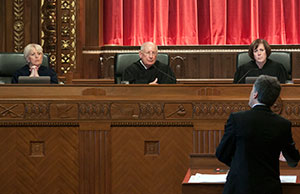Convicted Juvenile To Argue 112-Year Sentence Is Cruel and Unusual Punishment
Eight Cases on Supreme Court’s Agenda Feb. 3 and 4

Upcoming cases before the Ohio Supreme Court involve sentences for impaired drivers with prior offenses, admissibility of drug evidence gathered outside police officer’s jurisdiction, and a damages claim for wrongful imprisonment.

Upcoming cases before the Ohio Supreme Court involve sentences for impaired drivers with prior offenses, admissibility of drug evidence gathered outside police officer’s jurisdiction, and a damages claim for wrongful imprisonment.
The Ohio Supreme Court will consider the constitutionality of a juvenile’s sentence for multiple crimes that makes it unlikely he could be released during his lifetime. The case will be heard during oral arguments next Wednesday.
Brandon Moore was convicted in 2002 in Mahoning County for rape, robbery, kidnapping, and other charges. On Aug. 21, 2001, Moore, who was 15 at the time, robbed and abducted a young woman near her workplace, and then he and another teen repeatedly raped her at gunpoint.
Following an appeal, the trial court sentenced him to 112 years in prison for his offenses.
Moore points to the U.S. Supreme Court’s 2010 decision in Graham v. Florida, which held that it’s unconstitutional to sentence juveniles to life without parole unless the crime is murder. He argues that his sentence is essentially life without a chance for release. Graham’s intention is to protect minors convicted of non-homicide offenses from the harshest sentence possible for juveniles – being imprisoned for their entire lives, he asserts.
While release isn’t guaranteed for a juvenile with a de facto life term, courts cannot impose a sentence that precludes possible freedom at the outset, he contends. Based on the state’s calculation, Moore would first be considered for release at 92.
Other Cases Before the Court
In next week’s oral arguments, the court will hear four cases on Tuesday, Feb. 3, and four more, including Moore v. State, on Wednesday, Feb. 4. The court’s sessions begin at 9 a.m. each day at the Thomas J. Moyer Ohio Judicial Center in Columbus. The arguments will be streamed live online at sc.ohio.gov and broadcast live on The Ohio Channel.
Along with the brief descriptions below, the Office of Public Information today released summaries of each case.
Cases for Tuesday, Feb. 3
During Tuesday’s session, the court will consider these cases:
- In a public utilities appeal, Ohio Power Company, known as AEP, challenges an adjustment made by the state’s public utility commission to charges the company is allowed to assess when it delays the implementation of higher rates. AEP states it lost $130 million because of the commission’s modification. The company argues that its approved electric plan was final and that the change to the carrying charges was retroactive ratemaking.
- A man with a suspended Michigan driver’s license was stopped for slightly crossing the white line along I-280 by a Lake Township police officer, who was outside of the township’s jurisdiction. The officer found 30 milligrams of oxycodone and arrested the man. While the officer wasn’t in her jurisdiction, the prosecutors maintain in State v. Brown that the violation was technical and statutory, not constitutional, so the evidence gathered at the stop shouldn’t be excluded from the trial.
- The question before the court in State v. South is whether a Summit County man may be sentenced to five years for driving under the influence of alcohol (OVI). While he claims the sentencing statute only allows a three-year maximum sentence for the third-degree felony, the state contends that a law governing multiple OVI convictions during the prior 20 years permits a prison term of more than three years.
- The attorney disciplinary board in the state recommends an indefinite suspension for a Chillicothe attorney in Disciplinary Counsel v. Bunstine. The board found that the attorney took $10,000 to represent a former client who had been arrested, yet the attorney didn’t protect the man’s interests. The board also noted that the attorney claimed he represented the former client’s daughter, who had given him the check, rather than the client. The attorney counters that he never agreed to be the former client’s lawyer in the criminal matter, so no attorney-client relation was established.
Cases for Wednesday, Feb. 4
Along with Moore v. State, the court will consider these matters on Wednesday:
- In State v. Bundy, a man sentenced to three years in prison for failing to register as a sex offender had his conviction reversed after the Ohio Supreme Court ruled in 2010 that a relevant statute was unconstitutional. He seeks a determination that he was wrongfully imprisoned so he can file a civil case against the state for damages.
- A development company that purchased 88 acres of land in Granger Township claims it’s unable to develop the property the way it had planned because of a zoning resolution requiring a minimum of two acres per residential lot. In Apple Group v. Board of Zoning Appeals Granger Twp., the company contends that the zoning resolution violates a state statute. Because the township doesn’t have a separate comprehensive zoning plan based on its zoning resolution, the zoning policy is void, the company argues.
- A Cleveland attorney had improper sexual relations with four clients, the attorney disciplinary board has found in Cleveland Metropolitan Bar Association v. Sleibi. The board recommends that the attorney be suspended for two years, with one year stayed if he meets certain conditions. The bar association objects to the proposed sanction, asserting that the offensive and crude nature of his behavior and the toll on the women has been minimized.


